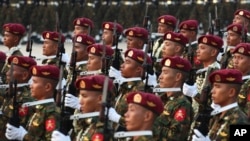On 1 February 2021, three months after losing a national election by a landslide, Burma's military staged a coup d’état and arrested the country’s elected civilian leaders. Much of the population of Myanmar, also known as Burma, rose up in mostly peaceful protests which continue to this day.
And to this day, the ruling junta continues to try to put down the protests, using increasingly brutal methods. “The last months have seen unrelenting violence across Myanmar,” notes a joint statement condemning the regime’s actions and signed by 13 members of the United Nations Security Council, including the United States. Russia and China, as well as India, whose term on the Council had ended, abstained from voting.
“More than two and a half years since the state of emergency imposed by the military in Myanmar on 1 February 2021, we remain deeply concerned at the situation in Myanmar and its impact on the people of Myanmar,” said the statement.
“The latest report on Burma from the UN High Commissioner for Human Rights concludes that the military regime has persistently targeted civilians through air strikes and the razing of populated areas,” said U.S. Representative to the United Nations, Linda Thomas-Greenfield.
A similar report by the Human Rights Council-mandated Independent Investigative Mechanism for Myanmar “states that there is strong evidence that the Burma military and its affiliate militias have committed war crimes with increasing frequency and brazenness – including indiscriminate or disproportionate attacks on civilians by aerial bombing,” she said.
Just two months after the coup, Burma’s military leaders agreed to a plan put forward by the 10-member Association of Southeast Asian Nations, or ASEAN. The plan required an immediate cessation of violence, and dialogue among all parties mediated by an ASEAN envoy. Subsequently, the UN Security Council adopted Resolution 2669, which also calls for an immediate end to violence in Burma, urges restraint, demands the release of arbitrarily detained prisoners, and calls for the full implementation of the ASEAN plan. According to the UN, there has been insufficient progress on implementing resolution 2669.
“The regime’s horrific atrocities must stop. Given the Burmese military regime’s intransigence and continued human rights abuses, it is time for the Security Council to act beyond Resolution 2669,” said Ambassador Thomas-Greenfield.
“We stand in solidarity with the people of Burma as they call for a return to peace, democratic governance, and the rule of law.”














